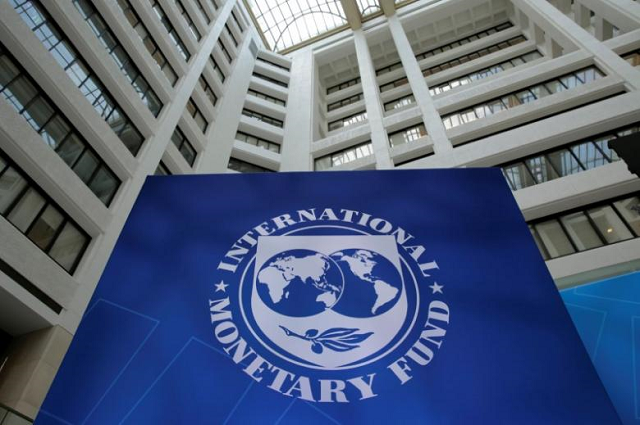IMF proposes cut in provincial share in NFC
Currently, Centre gets 42.5% of divisible pool while provinces receive the rest

The International Monetary Fund logo is seen here. PHOTO: REUTERS
During a staff level visit, the IMF urged Pakistan to strengthen the federal fiscal framework by finding ways to cut shares of the provinces in federal taxes, said sources in the finance ministry.
“Unlike the past, this time the IMF can leverage its position by placing a condition under a new programme,” the sources said.
Finance Minister Asad Umar on Monday announced approaching the IMF for a bailout package after reviewing his out-of-the-box options for almost six weeks.
The sources said that the IMF can make strengthening of public finance management a structural benchmark, which is considered a soft condition. The other option could be making it a performance criterion for the new programme, the sources said.
PM stresses need to 'effectively' defend decision on IMF bailout in media
However, the finance ministry was of the view that it cannot commit anything which is against the Constitution or law, the sources said.
They said any change in the present constitutional structure is only possible at the time of negotiations for the 8th NFC award.
Early this month, the finance ministry gave a reminder to the four provinces to nominate their members for the 9th NFC.
During the IMF stay in Pakistan, the finance minister wrote a second letter to all the four provincial chief ministers for reconstitution of the 9th NFC. He wrote the first letter on September 5. However, the provinces have not yet responded to the letter.
The NFC is required to be set up at intervals not exceeding five years as required under Clause (1) of Article 160 of the Constitution. The finance minister and provincial finance ministers are statutory members of the NFC. Each provincial government also has the right to include one non-statutory member.
The federal government cannot reduce the percentage of provincial shares without an agreement with the provinces, said Dr Hafiz Pasha, former federal finance minister.
Currently, the Centre gets 42.5% of the divisible pool while the provinces receive the rest.
Under the 7th NFC award announced in 2010, the provincial share had been jacked up to 57.5% of the total divisible pool.
But Dr Pasha said under the Constitution the President of Pakistan can redefine the size of the federal divisible pool by adding or deleting any tax in the pool.
“At any time before an Order under Clause (4) is made, the President may, by Order, make such amendments or modifications in the law relating to the distribution of revenues between the federal government and the provincial governments as he may deem necessary or expedient,” says Article 160 (6) of the Constitution.
“Since the 7th NFC award expired over three years ago and the resources are currently distributed on the basis of an amended order, the president can change the size of the divisible pool,” said Dr Pasha.
He said there was also a precedent when in 2006 the president issued an ad-hoc award.
At present, eight types of taxes constitute the divisible pool. These are income tax, wealth tax, capital value tax, taxes on sales and purchases of goods imported and exported, produced, manufactured or consumed, export duties on cotton, custom duties, federal excise duties and any other duty levied by the federal government.
Under Article 160 (6), the President can omit any tax from the pool.
Former finance minister Ishaq Dar and former caretaker finance minister Dr Shamshad Akhtar had proposed cutting the provinces’ share in the range of 6% to 8.2% to meet the extraordinary security expenditure and fulfill the requirements of the Azad Jammu & Kashmir, Gilgit-Baltistan and the formerly Federally Administrated Tribal Areas (Fata).
But Dr Pasha said that even without any change in the award, the federal government can still strengthen the fiscal framework by stopping spending on subjects that are now provincial matters under the 18th Amendment in the Constitution.
IMF cautions Pakistan against increasing Chinese involvement in economy
In its Article-IV report, the IMF had noted that the national fiscal federalism framework will be needed to support macroeconomic stability.
The 7th NFC award has resulted in an intergovernmental fiscal framework with a number of imbalances. The fund is of the view that the 7th NFC award has reduced flexibility in the economic management by narrowing the range and effectiveness of fiscal policy instruments at the federal level. The fiscal framework did not create mechanisms for dealing with large unexpected shocks, it added.
In the same report, the IMF proposed that flexibility of the federal fiscal framework could be improved by establishing a jointly-funded contingency fund aimed at absorbing large and unexpected shocks to expenditure of national importance.
Macroeconomic risks from the federal borrowing could be reduced by narrowing the vertical imbalance, for example, through the assumption of additional expenditure responsibilities by the provinces or through a burden-sharing arrangement with respect to joint areas of responsibility, it added.


















COMMENTS
Comments are moderated and generally will be posted if they are on-topic and not abusive.
For more information, please see our Comments FAQ